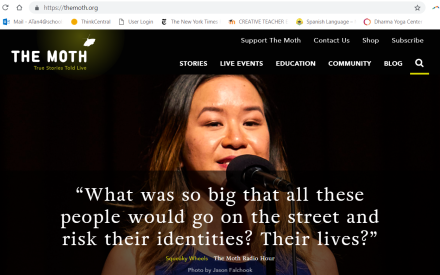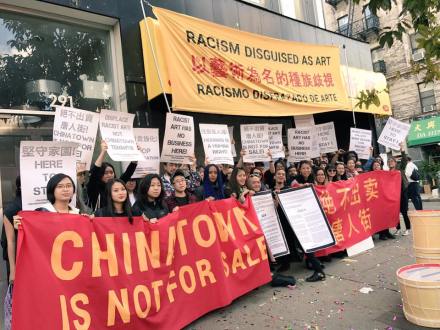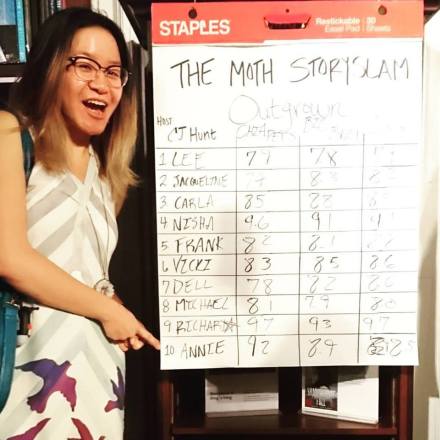I’m currently in tears, snot dripping out of my nose, an hour after finding out about the Jason Van Dyke verdict. Van Dyke was just found guilty of second-degree murder in the killing of Laquan MacDonald, and guilty of aggravated battery on each of 16 counts, one for each of the shots fired that night by Van Dyke. I didn’t think at all he would be found guilty- I thought there might be a hung jury or an acquittal, but it’s true: he’s guilty, and that’s that.
This week I taught my 4th- and 5th-grade students about plays: how actors act out different truths to share lessons and themes and stories. We read two plays: one on Martin Luther King Jr. as a child, and one with Sylvia Mendez, whose family was key in getting California schools to desegregate in the 1940s.
“They fought hard, Ms. Tan, and they wanted all the people to be together.”
The kids loved acting out the characters, but then we got into deeper conversations on race: how white people materially had better conditions under Jim Crow laws, how black and Mexican folk couldn’t go into the same pools, the same bathrooms, and schools, and how kids like Sylvia had to eat lunch outside in the dirt surrounded by a cow pasture and cow manure (“Poop, Ms. Tan!”) and electric gates that would shock the Mexican kids when they went to Hoover Elementary.
“That wasn’t fair, Ms. Tan. How come the white people could get all the nice things and the Mexicans couldn’t?” We noted that almost all the kids in our class were Mexican, too. I noted that all the kids in our class were not white, that we came from different backgrounds, and among us we spoke 4 different languages. That, if Jim Crow laws existed today, that our paraprofessional, who is white, couldn’t be with us.
And the kids said, “Are there racists now?” And I had to say, “Yes, there are a lot of people who still think they’re better than other people just because of their skin color.” We talked in past weeks about how women couldn’t vote before and how women get paid less and are assumed to do domestic duties. How hard is it to tell the kids the truth of the world, that so many people in my community are anti-black, that so many aspire to be white?
I’ve had students who wanted to scrub their skin to reveal the white underneath. And I had the duty to tell them they weren’t white. This white supremacy exists early on already in childhood, ugh.
This week also coincided with the end to our memoir unit: we took four weeks to brainstorm different events in our lives where we’ve learned lessons or changed as people, adding dialogue, details, feelings, reflections: and my students were so proud of their work. They typed out everything: “Ms. Tan, can I get a copy to show my mom?” And all the kids asked for copies to show their parents. It felt legit, to have a real typed-out copy to show. I gave the copies out today, one set for me to give feedback on, one to put in our Celebrations binder, and a last one for the kids to take home: and I can’t wait to hear how their parents saw their work.
Then, I brought the kids over to the smartboard and showed them the current homepage of The Moth:

(Side note: I was shocked last night when I went on the Moth website and saw my face! I’m also astounded at the cosmic alignment that made the ending of my memoir unit, weeklong unit about fighting for civil rights, and my Moth Radio Hour debut align on the same week! WHATTTT.)
And the kids were like, “THAT’S YOU, MS. TAN.” (And asked why I was wearing contacts and all that, of course.) I told my students that I, Ms. Tan, like them, had just published my own memoir this week, my own short story, and that it was on the radio this week. I told them the power of stories and that they can change people. I told them we write memoirs to help people be better and for them to change the world. That they could change the world, too, one day, with their writing.
“Ms. Tan, are you crying in the photo?” One student asked.
I didn’t even notice that: yes, I was. The story I told on that Moth stage was near and dear to my heart, a story I’d never told anyone before telling it on stage at a Moth StorySLAM last October. And that story is being heard around the nation this week on the radio, and next week in the podcast world.
In a world where Brett Kavanaugh is about to be confirmed and in a world where Jason Van Dyke could have walked free just yesterday, I have been in despair. I’ve not been getting as much sleep as I need, been busy in NYC with friends and writing and my partner, and I feel my body breaking down, emotionally and physically. Kavanaugh’s confirmation hearings for the Supreme Court have broken my spirits somewhat, and I’ve been listening to the WBEZ podcast 16 Shots to get updates and hope that Jason Van Dyke would get convicted of something. If he were acquitted, riots and protests would ensue in my beautiful Chicago.
But that didn’t happen, and justice has been served. Rest in power, Laquan MacDonald. I hope the sentencing of Jason Van Dyke in the coming days and weeks is fair.
“It’s not fair” though, were the last words that Vincent Chin spoke, I told my class. I shared photos of Vincent Chin, shared that he was supposed to get married the next week, that he was killed because the two white guys that killed him thought he was Japanese and hated him, and the kids were shocked to hear that the guys never served a day in jail.
I showed the pictures of people marching and rallying for Vincent Chin, demanding justice for his murder. That people decided they needed to speak up because things weren’t right.
“It’s like Martin Luther King and Sylvia Mendez,” one student said.
I’ve never told any of my students in my seven years teaching thus far about Vincent Chin. About my family story. And then I told them I was related to Vincent Chin.
I told my students a condensed version of the story I told for the Moth, my memoir that I had published this week on the Moth Radio Hour.
“No wonder you cried in that photo, Ms. Tan.”
I had chills leaving my classroom this afternoon. I didn’t know the world I’d be stepping into after the safety of being with my students all day. And, this story is always hard for me to tell, yet a story I must tell.
And now, again, I am crying, but now crying for justice for Laquan.
We can do this. We can continue to speak up and change the world. And maybe sometimes justice can be served.
Rest in power, Laquan MacDonald. Rest in power.
You can listen to the Moth Radio Hour episode at https://beta.prx.org/stories/253066 or at your local radio station around the country this week. I’m really proud of this story.
 In response to
In response to 
